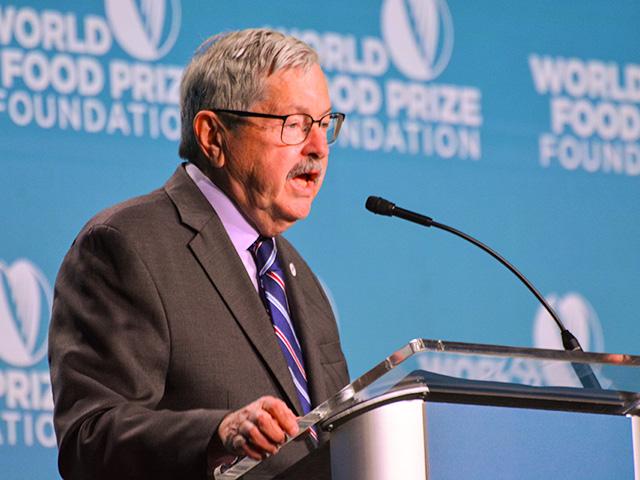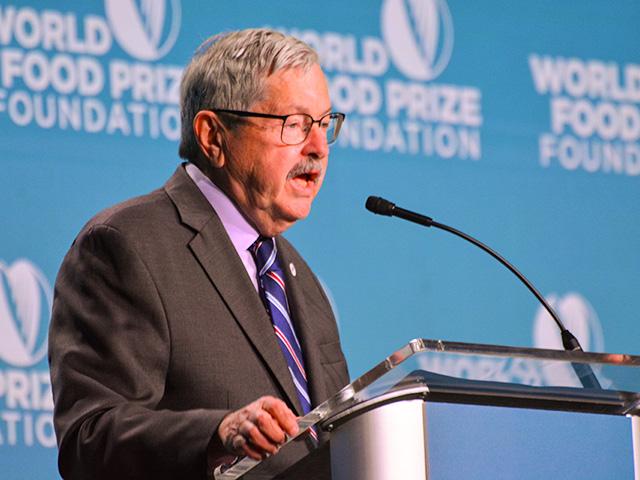Ag Policy Blog
Branstad Highlights US-Chinese Trade Interdependence in Signing of New Grain Deals
DES MOINES, Iowa (DTN) -- While Chinese agricultural ties have drawn fire lately, the ties between Terry Branstad and China help continue the trade relations.
Branstad, Iowa's former governor and the U.S. ambassador to China during the Trump administration, is now the CEO of the World Food Prize. This week, he also was part of the latest grain-buying ceremony between U.S. grain sellers and Chinese buyers on Monday in Des Moines, Iowa, the first major contract signing since before the pandemic.
"Obviously we have big differences with China, but China is a very important trading partner of ours, too," Branstad told DTN. "Certainly, Iowans understand how important agricultural trade to China is."
Branstad noted he had lunch Monday with an old friend, Xie Feng, the Chinese ambassador to the United States. Xie was part of the China-U.S. Sustainable Agricultural Trade Forum on Monday that led to the signing of 11 contracts between U.S. and Chinese grain companies for the export of U.S. soybeans, corn, sorghum and wheat. The volumes of grain included in the purchase agreements were not disclosed. Companies involved in the deals included ADM, Bunge, Cargill, CHS and Zennoh Grain.
"Again, people in China appreciate the quality and reliability and safety of American food and Americans also appreciate the quality and affordability of Chinese consumer goods," Branstad said. "So, we are interdependent and we need to try to work out our differences where we can."
P[L1] D[0x0] M[300x250] OOP[F] ADUNIT[] T[]
The U.S. Soybean Export Council touted the signing of the soybean and grain deals. Jim Sutter, CEO of USSEC, declined to share the volumes of the sales but called it "a significant amount."
Accumulated exports of U.S. soybean sales for the 2023-24 marketing year now sit at 3.36 million metric tons (mmt), compared to 2.46 mmt a year ago. Still, outstanding sales for 2023-24 soybeans are reported at 6.5 mmt, down 54% from 14.16 mmt for the same period last year.
Corn sales to China are 720,000 metric tons (mt), down 22% from the same period in the last marketing year, according to USDA.
While corn and soybean sales have declined, the rhetoric around Chinese land ownership in the U.S. has increased in the last year as well. Several states have enacted bans on land ownership from China, Russia, Iran and North Korea. Others have demanded more reporting on that information. There have been several bills in Congress looking to either ban land sales to people or entities from those countries or increase reporting on foreign ownership.
That led Arkansas officials earlier this month to become the first state to order a Chinese subsidiary to divest in land. Northrup King, a subsidiary of Syngenta Seed, was ordered to divest 160 acres the company has owned since 1988 in the state. Syngenta must sell the land within the next two years, or the state will go to court to force the company to sell. That action comes because Syngenta Seed is a subsidiary of a Chinese state-owned entity, ChemChina.
Branstad said the political differences between the two countries on several political fronts have created more friction recently. That's driving some states to react on their own.
"Yet, with companies like Smithfield and Syngenta, they have served Iowa farmers for a long time. And they have been good employers in this state," Branstad said. "So, we want to try to find ways to work with them, but we want to make sure they abide by the rules and do the right thing just as we want every corporate citizen to do that."
A key to easing tensions some of the U.S.-Chinese tensions is building personal relationships, he said. Iowa has had a sister-state relationship with the Hebei province in China since 1983. A year later, Branstad first went to visit China during his first stent as governor. In return, Xi Jinping made his first visit to Iowa in 1985.
"Having that kind of relationship can overcome some of the differences that we have," Branstad said." So, I think we have to continue to work to find ways that we can make friends work together and do business."
Also see, "Experts See Drive to Increase Food Production and Feed the World Going Backward," https://www.dtnpf.com/…
Chris Clayton can be reached at Chris.Clayton@dtn.com
Follow him on X, formerly known as Twitter, @ChrisClaytonDTN
(c) Copyright 2023 DTN, LLC. All rights reserved.





Comments
To comment, please Log In or Join our Community .